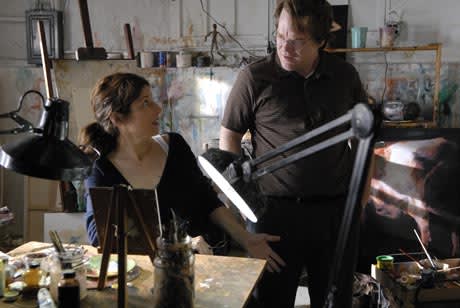The quest to make art that is challenging, ambitious and original has dominated the writing of Charlie Kaufman, seen in his screenplays for Adaptation, Being John Malkovich and Eternal Sunshine of the Spotless Mind. But it's in his directorial debut, Synecdoche, New York, that he tackles his most ambitious take on these themes, constructing a nesting doll of theatrical ambition and life meditation that's moving, engaging, profound and simply a masterpiece. It's also totally polarizing, as likely to induce a dismissive wave of the viewer's hand as to turn them into babbling idiots proselytizing its greatness. That reaction in itself is part of Synecdoche's mandate and goal - if it were easy to digest, it would be a failure in its creator's eye. Philip Seymour Hoffman stars as theatre director Caden, whose decaying body reflects the stagnancy he feels in his life. After his artist wife (Catherine Keener) leaves him, he searches for meaning in a theatre piece that will encompass nothing less than the meaning of life itself. For the rest of his life, he works to achieve said theatre piece even as it morphs to reflect his quest in its very form - by trying to make a piece about life, he has to incorporate that work into the art and its layers fold in on themselves repeatedly. A string of powerful women move through his life, as do their avatars in the theatre work, a remarkable list that includes Samantha Morton, Emily Morton, Michelle Williams, Dianne Wiest, Hope Davis and Jennifer Jason Lee. Kaufman's creation spends its first half in a recognizable world but moves slowly into a more dream-like consciousness, where metaphor becomes literal and identities and representations continually shift. There are many rich layers to be explored - Caden's gender identity is one; he's surrounded by remarkable women, gets mistaken for women several times and plays a woman in his own evolving theatre piece. The role of art - its creation and its purpose in an increasingly volatile world - is another. Even the title is a literature dissertation in itself; Caden suggests numerous titles for the piece he's creating throughout the movie, including Infectious Diseases In Cattle. Finally, what Kaufman has achieved is to fully realize film as the only way this story could be told - not by a play, nor a novel, nor a comic book. The DVD offers about as much critical discussion as you'd want (too much and it ruins the fun, too little and you'd feel alone). Keen film critics enthuse about their love for it and lament those who don't seem to get it (they are legion, and history will prove them wrong). Philip Seymour Hoffman reflects on Caden's self-absorption, and a making-of details the incredible effort that goes in to creating Caden's ongoing descent into self-reflection. Like a more specific David Lynch, Kaufman's creation demands repeat viewings and then rewards them in spades.
(Equinox)Synecdoche, New York
Charlie Kaufman

BY James KeastPublished Mar 27, 2009